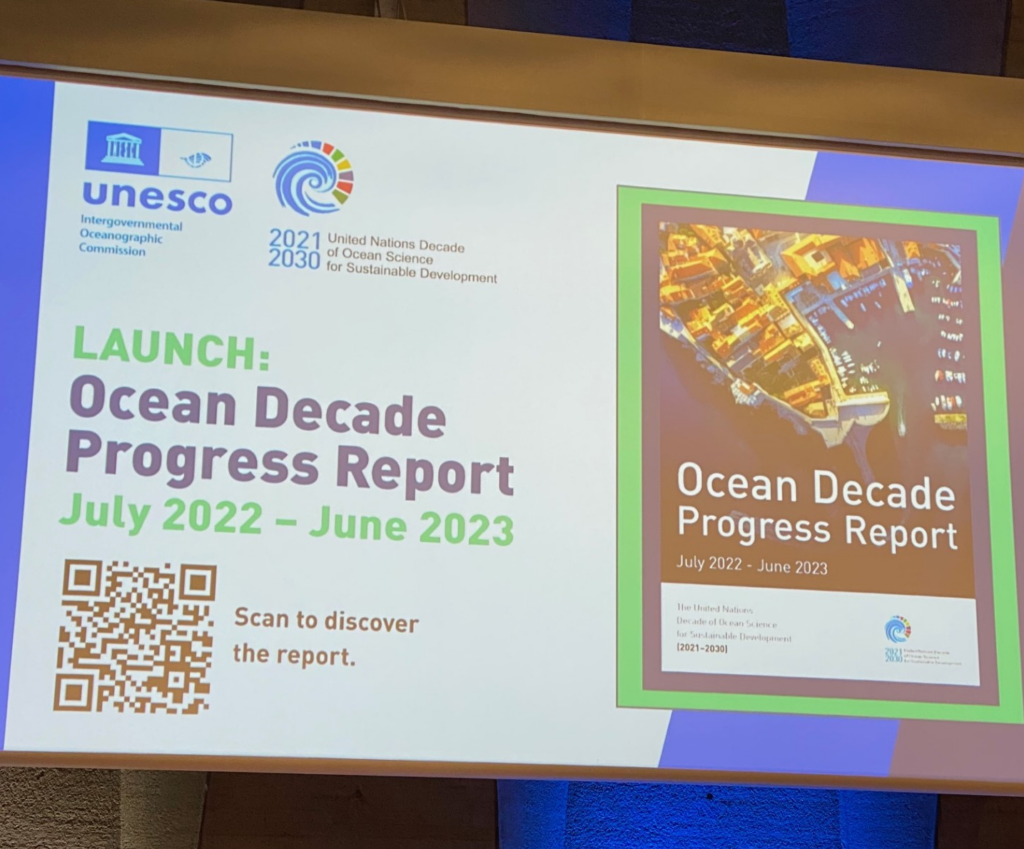Blog of Rina Dupriet, SI UN Representative at UNESCO.
Our oceans, covering 71% of the world’s surface, play a pivotal role in sustaining life on Earth. They feed us, protect us and, critically, absorb more than 90% of the excess heat generated by global warming.
The oceans are an invaluable source of economic, social and cultural values, where the intricate collections of coastal and marine biodiversity directly benefit nearly three billion people worldwide. This wealth of marine life and ecosystems forms the foundation upon which numerous communities build their livelihoods, fostering a deep connection between humanity and the oceans.

Today, scientific endeavours are particularly focused on the collection of data and observations amassed overtime, whilst the trajectory of oceanographic sciences are aligned with the 2030 sustainable development agenda and the ambitious targets encapsulated in Sustainable Development Goal (SDG) 14 (Life Below Water: Conserve and sustainably use the oceans, seas and marine resources for sustainable development). Importantly, if we are to achieve the targets established by SDG 14 and the desired outcomes of the United Nations Decade of Ocean Science for Sustainable Development (2021 – 2030), collaborative efforts are required by all stakeholders for ocean sciences if we wish to understand all the mysteries sheltered by the ocean, especially since 80% of the ocean floor is not yet mapped.
Vladimir Ryabinin, the Executive Secretary of the Intergovernmental Oceanographic Commission (IOC), urges a collaborative approach. Governments, scientific organisations, and entities from the private sector and civil society are implored to unite in unraveling the mysteries that the ocean conceals.
Proposals for a Sustainable Future
In response to this call for collective action, key figures in the field of ocean sciences, including Professor Judith Gobin (Trinidad and Tobago Faculty of Science), Secretary of State José Maria Costa of Portugal, Henrik Karboe from Norway, Deputy Director and IOC Member Nicole Leboeuf (USA), Assistant to the Minister in Canada Arran Mcpherson, and Dr. Kusdiantoro, Director General of Marine Spatial Planning (Indonesia), shared a set of proposals aimed at steering ocean science toward sustainability.
These proposals advocate for a comprehensive approach:
- Boost Funding for Ocean Science: Recognising the pivotal role of science, there’s a call to increase financial support for ocean science initiatives.
- Internationally Comparable Data Collection: Establishing a continuous and comparable data collection mechanism on global investments in ocean sciences is essential for informed decision-making.
- Co-Design with Stakeholders: Involving both users and producers of oceanographic information is vital to ensuring the relevance and effectiveness of ocean science efforts.
- Promote Multi-Stakeholder Partnerships: Collaboration is key. Multi-stakeholder partnerships and the transfer of marine techniques are essential for holistic progress.
- Inclusive Capacity Development: Capacity development in ocean sciences should prioritise equal participation from all countries, genders, and ages, integrating local and indigenous knowledge.
- Strategies for Women and Young Scientists: Defining and implementing strategies and plans to meet the professional needs of women and young scientists in the field of ocean sciences.
- Remove Barriers to Data Access: Finding solutions to eliminate barriers hindering open access to oceanographic data is crucial for advancing scientific knowledge.
- Education and Training: Promoting education and training in professions related to oceanographic sciences to build a skilled workforce for the future.
- Addressing Pandemic Impact: Evaluating the consequences of the COVID-19 pandemic on human and technical capabilities in ocean sciences to ensure resilience and adaptability.

Conclusion
In order to prepare for the great International Conference in Nice in 2025, an event which will be jointly organised by Costa Rica and France, it will be necessary to answer these major questions:
- What commitments will coastal countries make to ensure sustainable ocean management?
- How can international investment in ocean sciences be strengthened to address global challenges effectively?
- What strategies can be employed to transition from local-level initiatives to national-level impact?
The representatives of the two countries, Anna Katharina Muller Castro, Minister of Education in Costa Rica, and Olivier Poivre d’Arvor, Ambassador and Special Envoy of the President of the French Republic, have emphasised the role of UNESCO in this collective effort, urging the organisation to fully align itself with efforts toward achieving the objectives of SDG14.
To learn more about this subject, check out the Ocean Decade Progress Report (July 2022 – June 2023) published by UNESCO earlier this year.

